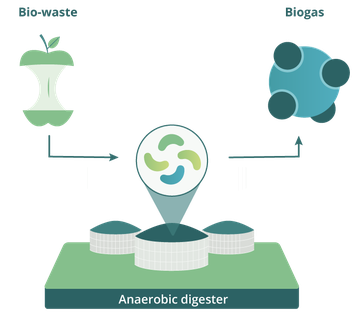Sustainable Food Security - Micro4Biogas
Introduction

14 partners
Coordinator: UNIVERSITAT DE VALENCIA: the University of Valencia (UVEG) stands out as one of the main public research organisations in Spain, has a well-known experience in synthetic biology and is currently leading a CSA on standardisation with 25 European and International partners. The research group Biotechnology and Synthetic Biology (Institute for Integrative Systems Biology, I2SysBio, UVEG-CSIC) focuses on microbial bioprospection of harsh environments to identify culturable strains of industrial interest. This research group contributes to the development of synthetic biology with studies on the history and conceptualization of the field.
Project descripiton

MICRO4BIOGAS aims to tackle these 4 aspects by integrating, for the first time, the use of microbial consortia that naturally inhabit anaerobic digesters with synthetic microbial consortia with improved capabilities, setting the basis for a user-friendly kit for bioaugmentation of biogas production.
Partners from 6 EU countries will work side by side to make a difference in the European biogas industry, that individually could not be achieved. By improving the biogas production in Europe, this project meets the EU Bioeconomy Strategy and the European Green Deal, helping to reach the Sustainable Development Goals (SDG7: Affordable and clean energy; SDG13: Climate Action) and working towards the circularity, resource efficiency and sustainability of the European countries
Objectives
MICRO4BIOGAS’ overall, ambitious objective is to dramatically optimise the biogas production process by using a bioaugmentation strategies based on microbial strains that naturally inhabit production tanks. These strains will be combined in the shape of synthetic microbial consortia, and these will be further improved through kinetic modelling, FBA and adaptive evolution.
Role of Ghent University
UGent will be involved in creating synthetic microbial consortia with improved performance. We will combine top-down and bottom-up approaches for microbial resource management in AD by augmenting the richness of natural microbial consortia with (artificially evolved) microorganisms to add and/or increase functionalities to the AD process in view of improving the AD process.
Website
Contact
Prof. Marjan De Mey
Department Biotechnology, Centre for Synthetic Biology
Phone number: +32 9 264 60 28
E-mail